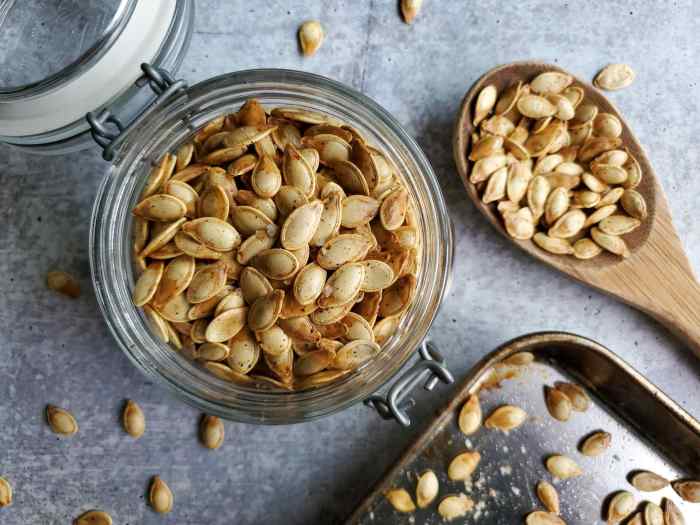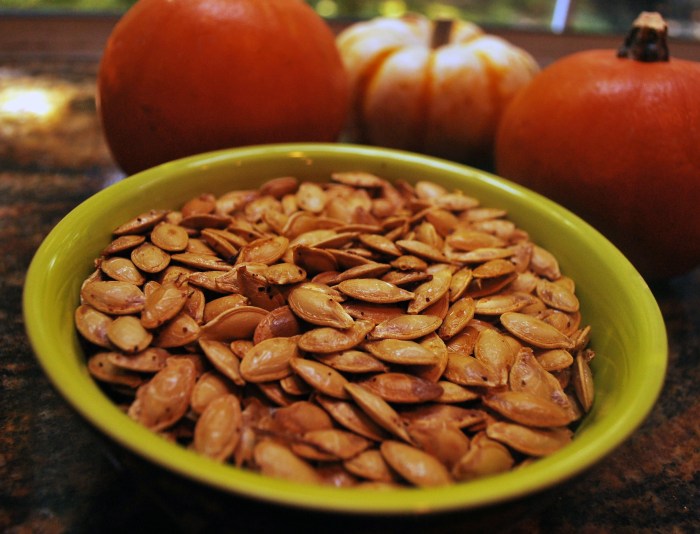Can You Plant Roasted Pumpkin Seeds?
Planting Roasted Pumpkin Seeds: A Comprehensive Guide: Can You Plant Roasted Pumpkin Seeds
Can you plant roasted pumpkin seeds – The delightful crunch of roasted pumpkin seeds is a beloved autumnal treat. But have you ever considered planting them? While the roasting process alters the seeds, it doesn’t necessarily eliminate their viability. This guide explores the feasibility of cultivating pumpkin plants from roasted seeds, comparing their performance to those grown from raw seeds, and outlining best practices for successful cultivation.
Pumpkin Seed Viability After Roasting

Source: homesteadandchill.com
Roasting pumpkin seeds exposes them to high temperatures, which can impact their germination potential. The higher the temperature and longer the roasting time, the greater the reduction in germination rates. Raw seeds generally exhibit significantly higher germination rates compared to roasted seeds. The optimal roasting temperature for maintaining seed viability is generally considered to be between 170-180°F (77-82°C) for 15-20 minutes.
Prolonged exposure to higher temperatures drastically reduces viability.
While roasted pumpkin seeds are generally not viable for planting due to the heat treatment, the question of seed viability extends to other fruits. For instance, you might wonder, similar to pumpkin seeds, if you can successfully grow a guava tree from seed; a question explored in detail at can you plant guava seeds.
Understanding seed viability, whether for guavas or pumpkins, is key to successful gardening.
To test the viability of roasted pumpkin seeds, perform a germination test: place a sample of 10-20 seeds between moist paper towels in a sealed container at room temperature. After a few days, count the seeds that have sprouted. A high percentage of germination indicates good viability.
Planting Methods for Roasted Pumpkin Seeds
Roasted pumpkin seeds can be planted using two primary methods: direct sowing and starting indoors. Direct sowing involves planting seeds directly into the prepared garden bed. Starting indoors involves planting seeds in containers and transplanting seedlings once they are established. Soil preparation is crucial; well-drained, fertile soil enriched with compost provides optimal conditions for growth. While growth rates may be slightly slower for plants grown from roasted seeds compared to raw seeds, the difference is often negligible with proper care.
To determine the optimal planting depth, a simple experiment can be conducted: plant groups of seeds at varying depths (e.g., ½ inch, 1 inch, 1 ½ inches) and monitor their germination and growth rates. This allows for the identification of the depth that yields the best results for roasted seeds.
Environmental Factors Influencing Growth
Sunlight, water, and temperature significantly influence the growth of pumpkin plants, regardless of whether the seeds are roasted or raw. Pumpkin plants thrive in full sun (at least 6-8 hours of direct sunlight daily) and require consistent watering, especially during dry periods. Ideal temperatures range from 70-85°F (21-29°C). Nutrient requirements are similar to those of plants grown from raw seeds; a balanced fertilizer can be beneficial.
One potential challenge is lower germination rates. Solutions include using a higher number of seeds per planting location and ensuring optimal soil moisture and temperature. Another challenge might be slightly slower initial growth, which can be addressed by providing optimal growing conditions.
| Factor | Pumpkins from Roasted Seeds | Pumpkins from Raw Seeds |
|---|---|---|
| Sunlight | 6-8 hours of direct sunlight | 6-8 hours of direct sunlight |
| Water | Consistent watering, especially during dry periods | Consistent watering, especially during dry periods |
| Temperature | 70-85°F (21-29°C) | 70-85°F (21-29°C) |
Addressing Potential Issues, Can you plant roasted pumpkin seeds
Common problems include low germination rates and stunted growth. Low germination rates can be improved by ensuring seed viability through proper roasting, using more seeds, and maintaining optimal soil conditions. Stunted growth can result from inadequate sunlight, water, or nutrients. Prompt attention to these factors is crucial for healthy plant development.
- Low Germination Rates: Check seed viability, ensure proper soil moisture and temperature, and consider using more seeds.
- Stunted Growth: Increase sunlight exposure, adjust watering schedule, and apply balanced fertilizer.
- Pest Infestation: Monitor for pests and use appropriate pest control methods.
- Disease: Inspect for disease symptoms and take necessary measures.
Healthy seedlings exhibit strong stems, vibrant green leaves, and vigorous growth. Unhealthy seedlings might show pale or yellow leaves, weak stems, and slow growth. They may also display signs of disease or pest infestation.
Comparison with Raw Seeds

Source: fromvalerieskitchen.com
Overall, pumpkin plants grown from roasted seeds may exhibit slightly slower growth and potentially lower yields compared to those grown from raw seeds. The quality of the pumpkins themselves is generally similar, although subtle differences in flavor or texture might exist. Economically, using roasted seeds could offer cost savings if the seeds are already available, but this advantage is offset by the potential for lower yields.
| Feature | Roasted Seeds | Raw Seeds |
|---|---|---|
| Germination Rate | Lower | Higher |
| Growth Rate | Slightly slower | Faster |
| Yield | Potentially lower | Potentially higher |
| Cost | Lower initial cost (if seeds are already roasted) | Higher initial cost |
Query Resolution
Can I use pumpkin seeds from store-bought roasted pumpkin seeds?
Generally, yes, but success depends on the roasting method. Lightly roasted seeds have a higher chance of germination than those heavily roasted or salted.
How can I tell if my roasted pumpkin seeds are still viable?
Perform a germination test: place a few seeds on a damp paper towel in a sealed bag. Check for sprouting after a few days.
What type of pumpkin seeds are best for planting, regardless of roasting?
Choose seeds from healthy, mature pumpkins. Avoid seeds that are damaged, discolored, or moldy.
Are there any specific nutrients I should add to the soil for roasted pumpkin seeds?
Pumpkin plants benefit from nutrient-rich soil. Consider a balanced fertilizer with added compost to ensure optimal growth.





















